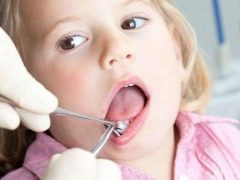Psychosomatics of periodontal disease in adults and children
Periodontal disease is a disease that affects both children and adults. Despite the fact that in modern dentistry there is little unsolved left, periodontal disease refers specifically to such illnesses, the beginning of which and their aggressive course of medicine are not always able to explain. But psychosomatic medicine offers its explanation, which can help in the treatment of disease.
General data on pathology
Periodontal disease is a profound damage to the tissue located near the tooth. But the concept of "periodontal disease" is considered obsolete, modern medicine offers to use only the term "periodontitis", because it is more correct from the point of view of everything that happens in a person's mouth.
When periodontitis in the gums, "pockets" are formed, pus and blood are released from them, the teeth themselves become more mobile, loosened and can gradually be lost. This clinical picture corresponds to the aggressive forms of the disease. In chronic lesions, deposits of tartar are moderate, and the teeth are fairly well fixed in the gums. But even this form gradually progresses.
It is believed that periodontitis is usually caused by a violation of the requirements for oral hygiene. And also researchers cite genetic predisposition. It is believed that a disease that occurs with changes in bone tissue, most often develops with diabetes mellitus, with hormonal disorders and various chronic diseases that a person has.
Parodontitis can be completely cured only in the early stages; then it is possible only to maintain the condition of the teeth with the help of surgical methods and materials.
Psychosomatic causes
The starting mechanism of development of periodontitis by science has not been studied, that is, the factors that are the first to trigger the process of destruction of the tissues around the tooth are not reliably known. In this regard, experts in the field of psychotherapy, psychoanalysis of diseases and dentists do not exclude that it is psychosomatic reasons that can trigger the destructive process.
Psychosomatics often calls periodontitis a "disease of latent aggression." Teeth is a demonstration of human power, its ability to defend, defend, hunt. If he is afraid to take a step forward because of the fear of failing, his teeth begin to deteriorate, he does not use them for their natural purpose.
At the physiological level, a person with periodontal disease has a deterioration in the blood supply to the gums, the vessels narrow, and blood flow to the gums is much less. This has its own nature provided logic: if you grabbed prey with your teeth, and it suddenly turned out to be infected, sick, poisonous, contagious, then you are always more likely to survive if less of the toxin in the blood. Gum vessels are narrowed to protect.
Modern man rarely enough teeth prey, and what he puts in his mouth, usually checked and safe. Calm for food is also transmitted to the attitude to those events and phenomena that a person also has to “grab his teeth”. Adrenaline, which remains unspent due to our ubiquitous calmness when eaten, begins to have a vasoconstrictor effect on an ongoing basis. The gums of such a person are strained not only when they bite food or a situation, but also at other times. This is what causes the development of destructive processes.
Experts in the field of psychosomatics claim that people with periodontal disease are afraid of the consequences of their decisions, and therefore sometimes even have to give up on decisions, preferring that important situations should be “settled” by more “toothed” and “predatory” compatriots. Frequent attacks of despair and helplessness are characteristic of the patient himself.
It is believed that all the inhabitants of the planet suffer to some extent with the gums, but the inflammation begins, the gums sharply ache and bleed in strictly defined situations: when a person forbids himself to do something, decide something, take responsibility, on themselves anger for it.
It is worth a man to afford what he wants, and the inflammation of the gums passes. If you do not believe - you can check for yourself.
Opinion researchers
Popular researchers in the field of psychosomatics have different opinions about bleeding gums and teeth loosening. Louise Hay in the manifestations of the disease saw the lack of joy in a person when making decisions. She believed that this disease often affects those who are forced to make decisions that are not enjoyable and cannot be executed. She emphasized that periodontal disease is more characteristic of people who lead amoebic existence, consciously leave decisions, prefer to be led.
Canadian researcher Liz Burbo argues that the root of the disease lies in the fact that a person is afraid to express their desires and needs, prefers to remain a “gray mass”, to be invisible among the crowd. When he is faced with a certain problem, he experiences helplessness and panic, a feeling of fear puts pressure on him, it is during this period that periodontitis begins to worsen.
Dr. Valery Sinelnikov argues that problems with teeth, in particular, with gums, say that a person slanders a lot, tries to "scoff", but does it exclusively behind his back, not daring to open confrontation. If at the same time he casts doubt on family and other values that in society are classified as eternal, then the bleeding from the gums opens.
Treatment
It is important for a person with periodontal disease to find their place in life - to clearly identify their positions.
No matter how much you want to sit on the sidelines, while the stronger ones solve the current problem, it is important to learn how to take part of the problem on yourself, take responsibility for the decision and put it into practice.
It is easiest to teach such a position of children - while for them mom and dad, grandmother and grandfather decide everything, the child creates all the prerequisites for the development of gum disease. As soon as the child begins to give the age-appropriate tasks and responsibilities, he is trained to set goals and go to them.


















